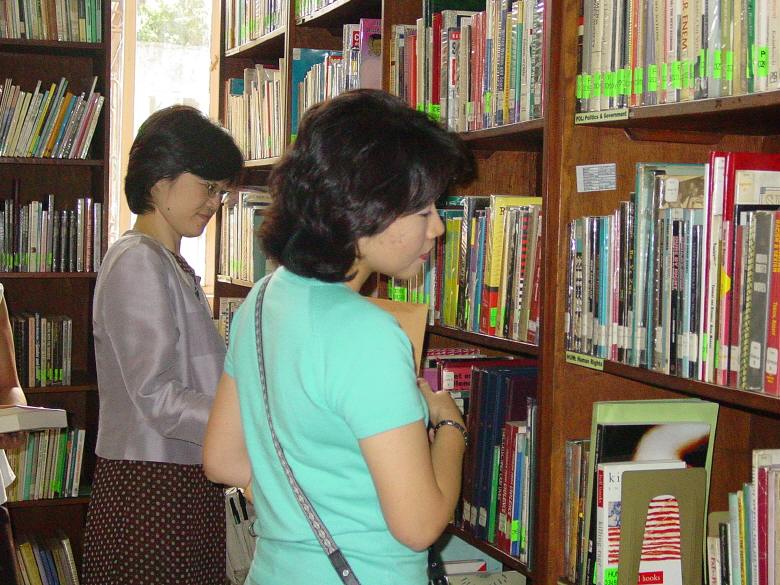by Nina Somera
The Resource Center started in a little corner at the International Documentation Center (IDOC) in Rome in the heady days of the 1970s. Rome was a hub of solidarity movements, hosting exiles including the sisters who found Isis Internacional in Santiago, Chile.
Although there was a dearth of writings by women from the South, the Resource Center grew. It collected analytical pieces written by women about the issues of the day. A lot of them came from small meetings on food security, sustainable agriculture, environment, health, especially maternal health and sexual and reproductive health and rights (SRHR). A lot of them have not seen print in any mainstream publications and even academic journals. Most of them are monographs.
But the Resource Center grew, establishing itself both as a repository of materials on feminist movement-building and a space for conversations among feminist activists. It was far more than a structure, that indeed backed up the direction of Isis as an information-sharing platform among Southern women’s rights organisations and networks.
The Resource Center became the heart of the office. No wonder that when Isis managed to buy its first computer, that machine was immediately dedicated to the Resource Center. The Center’s profile also increased, such that some of the more progressive mainstream printing houses began sending some books for review.
When Isis moved to Manila, in its bid to be more grounded in the South, the Resource Center went with it. It is not difficult to imagine how Marilee Karl lovingly unpacked, organised and reorganised the books she brought with her, along with her daughter Alice. Many years later during her visit, she would review over and over some files, including personal letters which tell the story of Isis.
The management of the Resource Center was eventually integrated into Isis’ research programmes. So much investment was poured towards a database of all the articles and materials housed in it. It is unfortunate that such expensive project remained unfinished. It is only in recent years that another attempt has been made, inspired by the digitization of all the materials of Isis Santiago before it closed down.
For external users, the Resource Center became a cozy reading nook in the company of books on feminist theories and movement-building, long before the leading universities established libraries and sections on women’s rights, sexual orientation and gender identity and expression (SOGIE) and their intersections with media, health, religion, agriculture, environment, climate change and so on. To this day, it still has a unique collection of journals of feminist organisations around the world. Nearly all of them are no longer in circulation.
At the turn of the mill ennium, Isis helped establish the Asian Women’s Resource Exchange (AWORC), a regional platform that sought to bring together progressive resource centers and increase the availability of feminist content on the internet. This, following a workshop that Isis organised in 1998 on content-sharing approaches online, when the internet was still considered as part of the “new information communications technologies”.
ennium, Isis helped establish the Asian Women’s Resource Exchange (AWORC), a regional platform that sought to bring together progressive resource centers and increase the availability of feminist content on the internet. This, following a workshop that Isis organised in 1998 on content-sharing approaches online, when the internet was still considered as part of the “new information communications technologies”.
Isis is now in the process of digitising its publications since the 1970s. This includes the Bulletins, which highlighted the issues which budding women’s rights organisations in the South were advancing and Bottled Babies, which critiqued the proliferation of formula milk in the market. These and many more resources will be available online as part of the Feminist Archives project.
The history behind the Resource Center indeed made the sorting of books, which to keep and which to let go, quite difficult. We kept the journals, reference books on feminist theories and practices, those on feminist movements and those which are out of print. Those which came from Rome are still intact. The rest was donated to the Quezon City Public Library, the Institute of Women’s Studies of St. Scholastica’s College, Women’s Global Network on Reproductive Rights, Miriam College and women-led community based organisations.
Today the space awaits a repurposing and rebirth. The Resource Center will not be the same but its history will be at the core of Isis’ future.






 The
The 
 Isis Resource Center holds one of the largest feminist collections of materials in the Global South. With 40 years of publication experience, Isis holds a vast collection.
Isis Resource Center holds one of the largest feminist collections of materials in the Global South. With 40 years of publication experience, Isis holds a vast collection.